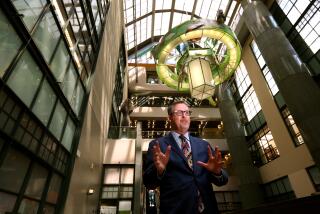Extensive Collection : From Hogs to Hay, This Library Has Farm Facts
- Share via
WASHINGTON — Isaac Newton very likely would be ecstatic about his 14-story brainchild in the Maryland countryside.
When Newton--not the English inventor but America’s first agriculture commissioner--laid out his ideas in 1862 for a new national agriculture department, he urged that a library be created that would serve as the premier source of agricultural information for the country.
From a modest beginning with 1,000 volumes that year, the National Agricultural Library has grown to become the most extensive collection of agricultural information in the free world: more than 1.8 million volumes and growing.
The library’s archives, housed since 1969 in an ultramodern tower at the Agriculture Department’s Beltsville, Md., research complex, are the U.S. agricultural science establishment’s lifeline and its link to the rest of the world.
No Exaggeration
That is not an exaggeration. Roughly 60% of the library’s collection comes from overseas sources and much of it is made available to scientists and economists, the chief customers of the library, by a corps of translators.
Say, for example, that a researcher at Iowa State University is studying hog survival in subzero temperatures. Once past the reality of Iowa winters, he quite naturally might turn to experiences in other cold climates.
The Iowa researcher can write or call in to the library for help. Or he can plug into the library’s “Agricola” computerized information base and almost instantly come up with a catalogue of hog-survival research published in Sweden, say, or the Soviet Union. And if the library doesn’t have the research papers, it can tell him where to find the information he needs.
If for some reason it didn’t occur to him to ask about hog research in northern Canada, the library might tell him anyway through a regular service that alerts scientists in the USDA and the land-grant universities when new information is available on all manner of agricultural subjects.
Benefits Consumers
The end result of this hypothetical exercise might be healthier hogs in Iowa that could be grown more economically or more profitably, to the benefit of both farmer and consumer.
Much of the library’s scientific material comes from the more than 23,000 periodicals it receives each year, almost half of them from abroad. Most of this, like the hogs-and-climate stuff, is so arcane that it is of little use or interest to the general public.
The library’s audience is changing, according to public affairs director Eugene Farkas, and it increasingly collects non-technical data to satisfy the needs of farmers and consumers who call for help. Special collections on such topics as nutrition and aquaculture are maintained by the library.
For all that, however, a blue-ribbon panel appointed by Agriculture Secretary John R. Block reported in 1982 that the library needed more services, more funds, more acquisitions--even with severe federal budget restraints--to keep the library faithful to Newton’s ideal.
And since 1983, when Joseph H. Howard moved from the Library of Congress to head the agricultural library, the emphasis has been on greater service to researchers and coordinating information exchanges between federal and university libraries.
The library also has a bent for history, which means accumulating as much information as it can about the role of agriculture in the growth and development of the country. The library’s rare-book collection contains 8,000 volumes, some dating to the 1500s.
One of librarian Alan Fusonie’s favorites is the collection on Prince family, the first commercial nurserymen in America, whose Flushing, N.Y., operation began in the 1700s. Among those papers is a copy of the first known nursery catalogue in this country, a handwritten brochure put together by founder William Prince Sr. Prince’s idea caught on quickly and many of the other seed catalogue “firsts” that followed are in Fusonie’s collection.
“It’s a fabulous collection,” Fusonie said, “literally tracing the seeds of capitalism in this country.”
Pun or not, Newton would have liked that.
More to Read
Sign up for Essential California
The most important California stories and recommendations in your inbox every morning.
You may occasionally receive promotional content from the Los Angeles Times.













